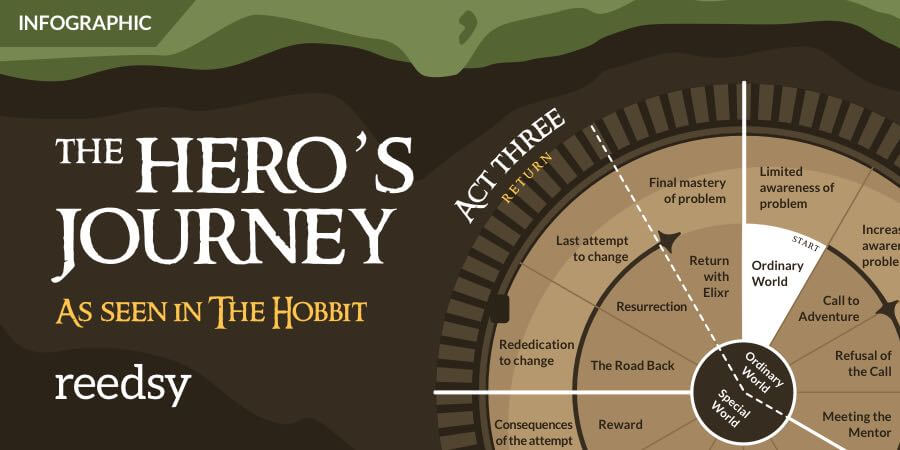With Valentine’s Day right around the corner, couples everywhere have love on the brain. And, just like the onslaught of Hallmark Christmas movies in December, you’ll start seeing a lot more romantic comedies grace the front pages of Netflix and the line-up for cable networks.
You obviously don’t have time to write, shop, produce and distribute your romantic comedy in time for this Valentine’s season, but you can use the spirit of mid-February to at least get started writing your own.
People assume that writing a rom-com is an easy task, but it actuality it’s a complicated process – a fine balance between formula and freshness, which needs compelling characters and relatable moments. To start you on your romantic screenwriting journey, here are a few critical tips and considerations.
Follow the Hero’s Journey

Source:blog.reedsy.com
Unfamiliar with the hero’s journey? Chances are you know it intuitively. It’s the framework for virtually every piece of popular storytelling, dating back to the Ancient Greeks. A concept popularized by Joseph Campbell, a professor of literature and mythology, the hero’s journey remains an indispensible tool in the screenwriter’s arsenal.
The concept has been adapted specifically to screenwriting, in popular instructional books like Save the Cat, but the principles remain the same. You have the “call to action”, the “refusal of the call”, the “meeting of the mentor”, and later on, “the dark night of the soul” when all feels lost for the main characters. Watch any romantic comedy, with a copy of Save the Cat or Campbell’s The Hero With a Thousand Faces in your lap, and you’ll see just how prevalent this framework is.
But Don’t Be Too Formulaic
Just because your script follows the big beats of the hero’s journey, it doesn’t mean you can snooze on invention entirely. If you’re going to write an attractive screenplay, one that lands you a big contract, you have to keep it fresh.
There are plenty of ways to add freshness and newness to the old romantic comedy formula. If most rom-coms you see are set in a big city like New York or LA, set yours somewhere new: Alaska, the backwoods of Iowa, or even on a spaceship! Ask yourself whether your particular love story has been told before.
Workshop Your Script
Granted, this is a tip you can only follow when most or all of your script is complete, but it’s an important tip nonetheless. No great screenplay was developed in a vacuum, and sooner or later you’ll have to solicit opinions and advice from others.
This is where mentorship comes in handy. Join a mentorship program that helps young screenwriters get their ideas off the ground with help from industry insiders, mentors that can help you polish your dialogue, add depth to your characters and punch up the humor – you can learn more at Wjsff.org about screenwriting mentorships.

Source:wescreenplay.com
Invest in Characters
A common criticism, from both producers and (eventually) film critics, is that they “didn’t care about the characters”. It’s a totally valid critique. How is someone supposed to invest in the love story, the romance and the story stakes if they don’t know a lot – or care a lot – about the characters involved?
That said, it’s up to you to craft real, sympathetic, relatable people. It’s up to you to ensure that their traits are consistent, their troubles are relatable and their motivations are in keeping with their qualities and disposition. Do this through thoughtful dialogue and meaningful establishing scenes. The first 10 pages are important for establishing robust characters, so start strong!
Remember That Opposites Attract
Two protagonists that get along immediately, and then continue getting along, are going to bore the socks off most audience members. There needs to be friction. There need to be fundamental differences between the two romantic leads that they eventually overcome.
Maybe your leading man is all about business, channelling all his energy into his career; maybe your leading woman is a free spirit. Maybe your leading woman comes from a traditional family, who wants her to end up with a specific man; maybe your leading man isn’t that type of guy at all. You get the idea. Make sure that there is tension and opposition in the relationship, at least initially.
Craft Your Blowout Moment

Source:elitedaily.com
The best romantic comedies have one moment that makes the audience want to stand up and cheer. It might be when the couple finally kiss atop a tall building at midnight. It might be when the leading woman finally tells her parents that she doesn’t care what they think anymore – she’s in love. It doesn’t matter the particulars; what matters is that your script has a blowout moment.
This moment, ideally, arises naturally from the story preceding it. Sure, you can manufacture a big moment, but it will ultimately feel hollow. If your romantic couple has been fighting about a old girlfriend from the leading man’s past, for instance, your blowout moment can be the man finally telling the old girlfriend that it’s over. The blowout moment is a culmination – and shattering – of all the tension you’ve worked to build in the story.
Have a Happy Ending
There are times where you just don’t want to reinvent the wheel – the happy ending is one of them. Give the audience what they want. You don’t have to scream “and then they live happily ever after” at your audience, but at least give them a glimmer of hope, an indication that things are going to work out for the leading couple.
Good romantic comedies should reaffirm the power and presence of love, so make sure your audience walks away feeling as wonderful as your leading couple.
Romantic comedies can be incredibly lucrative, and they’re a great way for serious screenwriters to cut their teeth in the industry. Just be mindful of the common framework, break away from formula a bit, and create compelling, unique characters that overcome their differences and find a happy ending. Do this, and you’ll write a script worth falling in love with.






